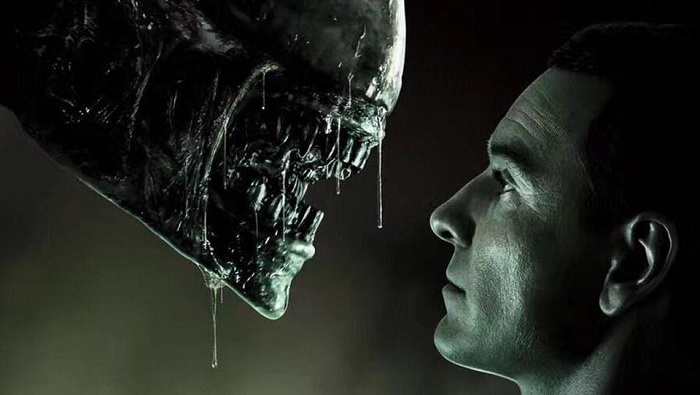

Spoilers abound. Read at your own peril.
In 1979 director Ridley Scott unleashed Alien on an unsuspecting populace, laying the foundation for a franchise that has seen its ups (Aliens, parts of Alien 3) and downs (literally everything else). In 2012, Scott returned to the franchise with Prometheus, a prequel that attempted to explain some of the broader mysteries of series. Alien is a beautiful masterpiece with its simplicity and straightforwardness. Prometheus is a beautiful disaster, filled with lots of pretty things along with unnecessary questions that ultimately go unanswered. Alien: Covenant, Scott's follow-up to Prometheus, is meant to serve as a bridge connecting the prequel to the original… sort of. Like its predecessor, Covenant ends on a cliffhanger indicating there's more story to tell before we arrive at the iconic kick-start to the series. But is all this backstory necessary?
Covenant picks up 11 years after Prometheus. An unforeseen accident wakes the crew of the colony ship Covenant and sets them on a course to the source of a mysterious radio transmission on an as-yet undiscovered planet. Upon arrival they're confronted with an airborne pathogen that grows neomorphs (think the xenomorph but fleshier) inside the bodies of the infected. The beleaguered crew is granted a short reprieve in the form of David, the murderous android from Prometheus. But relief is short lived once David's true intentions are revealed.
Alien: Covenant attempts to be both prequel and sequel to two wholly different films, and in serving those two masters it winds up failing them both. I might have my issues with Prometheus, but it stands to reason that the questions raised in that film (Who are the Engineers? Why are they now trying to kill us?) merit answers in a sequel. Covenant addresses the Engineers in a manner that again suggests all of this is being made up on the fly. Prometheus ends with Dr. Shaw (Noomi Rapace) on her way to the Engineers home world, hell-bent on confronting them and finding answers. The overarching crux of Covenant's predecessor is done away with in a flashback, as David obliterates the Engineers upon his arrival to the planet. So, like, sorry to anyone who really wanted to know what the Engineers were up to in Prometheus. This is The David Show now.
But this new film goes even further. David's been busy in the lead-up to Covenant, perfecting the work of the Engineers and growing new monsters. When the colonists answer his distress signal, it's time for David to test his greatest creation: the xenomorph. Yes, the iconic monster of the Alien franchise was created by the murderous, beheaded android from Prometheus. Ugh, go home Alien: Covenant, your drink was spiked with evil alien DNA.
David is a problematic character. His motivation is foggy, his intentions unfocused. Fassbender is clearly enjoying himself, but David is all broad strokes and mustache twitching, a clichéd mad scientist whose sole defining characteristic is he's an evil AI run amok. Sadly, the rest of the cast doesn't fare much better.
Katherine Waterston's Daniels is clearly a callback to Ripley but is underrepresented. Efforts to attach her to some real heartache in the early portions fall short, as her character feels completely disposed of in the second act. She returns in earnest later on when the script requires someone to fight the alien. Billy Crudup's Oram probably gets too much screen time as Covenant's first mate. A subplot about Oram's faith pays off in a throwaway line that feels forced and unearned. Honestly, Oram and Daniels could've been combined into one lead character as they both feel underwritten and leave few lasting impressions. As Tennessee, an affable southern gentleman and pilot, Danny McBride fares best, proving he can be more than a distraction in serious roles. The rest of the cast is completely disposable save for, again, Michael Fassbender. He pulls double duty as Walter, a more advanced android and foil to David. Walter's presence feels reverse-engineered for a late film twist that's poorly concealed and easily telegraphed.
Which brings us to the xenomorph. No amount of prequels can diminish my love for Scott's 1979 masterpiece. But the more we find out about the xenomorph's backstory, the less I want to know. Movies like Prometheus and Covenant do a disservice to a creature that once traded solely on fear of the unknown. The revelations in these prequels serve to confuse and diminish the, well, alien-ness of Alien.
In using Covenant to tie the themes of Prometheus to Alien, Scott betrays all three films. Meditations on our creators and their intentions prove an ill fit for a franchise that was once only about an alien that pops out of your chest and kills all your friends. I have no doubt that these themes of life and creation are important to Scott, but it has never been clear save for the cash-in potential why Prometheus needed to tie in with Alien. Covenant sets us on a course that will eventually lead back to where we started. Here's to skipping the rest of this journey and just enjoying the destination.











